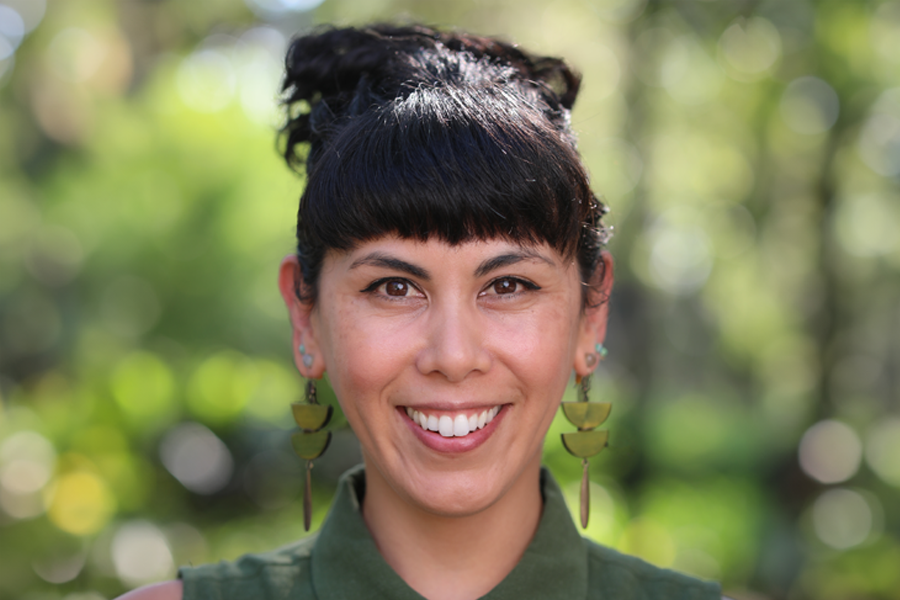Faculty Spotlight: Michelle Bumatay

Michelle Bumatay is an assistant professor of French and the French graduate advisor in Florida State University’s Department of Modern Languages and Linguistics, part of the College of Arts and Sciences. In 2013, Bumatay earned a doctorate in French and Francophone studies from the University of California, Los Angeles. She joined the FSU faculty in 2019 and has for the last several years organized the Winthrop-King Institute for French and Francophone Studies annual Global Africas series, which explores the cultural complexity of Francophone Africa. Bumatay also earned the 2024 Stephen Risley Family Fellowship — an award supporting FSU’s junior faculty in research as they work toward tenure — to finish her upcoming monograph, “On Black Bandes Dessinées and Transcolonial Power.”
Tell us about your background, where you’re from and what brought you to FSU.
I’m originally from California, and I applied for a position at FSU after presenting at the Performance of Pan-Africanism: From Colonial Exhibitions to Black and African Cultural Festivals, an international conference hosted by FSU’s Winthrop-King Institute in 2016. The conference brought together world-renowned authors and researchers, allowing me to make instrumental connections. I was impressed by the Winthrop-King Institute and by the French faculty and students. I knew I wanted to be part of such a dynamic program.
Can you break down your areas of study for us?
I’m trained in French and Francophone, or French-speaking, literatures and cultures, and I specialize in Francophone Africa and contemporary France — particularly France’s overseas departments and regions. My research sits at the intersection of French studies, media studies and art history. While my publications mainly cover Francophone comics and visual culture, I also study Francophone cinema.
What inspired you to specialize in African Francophone literature and visual culture?
I grew up reading comics, playing video games and watching anime, but I didn’t discover French comics until my undergraduate studies at the University of California San Diego. After taking several classes during my graduate studies at UCLA, I developed an affinity for African Francophone literature and film. After exploring the vibrant and understudied network of African Francophone cartoonists, I instantly knew what my main research topic would be.
Tell me about the annual Lawrence R. Schehr Memorial Award you received in 2015 for your conference paper, “Notre historie and Madame Livingston: Travels in Time.”
I presented this paper at the biannual International Bande Dessinée Society Conference in Paris. My paper engaged with questions of French national identity and representation by comparing an autobiographical graphic novel, “Notre historie” — translated to “Our History” — by Sam Garcia, Lilian Thuram and Jean-Christophe Camus, to a historical fiction graphic novel, “Madame Livingstone: Congo la Grande Guerre” — translated to “The Great War in the Congo” — by Christophe Cassiau-Haurie and Baruti Kandolo Lilela, better known by his pen name Barly Baruti.
Prior to my selection, this award had never gone to someone working in comic studies. This achievement was a testament to comics as an established field of research and to my contribution to multiple disciplines.
How did the Stephen Risley Family Fellowship aid in writing your upcoming monograph?
“On Black Bandes Dessinées and Transcolonial Power” will be the first English book covering the diversity of comics written by Black Francophone artists since the 1960s.
This book reveals that though there has been increased interest in Black comics due to Marvel’s film adaptation of the comic “Black Panther,” Black Francophone artists have been generating local, regional, and international audiences for over half a century. This fellowship, which I’m honored to be awarded, has allowed me to devote the summer to preparing the manuscript for production.
What do you want the public to know about your research?
I want people to know about the rich diversity of the Francophone world, which expands far beyond France. My research highlights the robust network of artists, authors, and filmmakers from Francophone Africa and illustrates how they’ve tackled questions of identity, belonging and politics. These individuals are simultaneously entertainers, archivists, intellectuals and sociopolitical commentators. My research aims to expand the audience of their complex work.
Tell me about your position as the organizer for the Winthrop-King Institute’s Global Africas series.
Through the Global Africas series, I’m able to bring world-class scholars, authors, filmmakers, and artists to campus for interdisciplinary discussions. This series creates space for those interested in Africa and Africa’s global interconnectedness. The Global Africas series is crucial to the French Program because a majority of French speakers live in Africa, and one of the series’ main goals is to encourage student and community interest in Africa.
What is your favorite memory from FSU so far?
In the Fall 2022, as part of the third Global Africas colloquium, Senegal: Past and/as Present, I interviewed and live translated a conversation with Senegalese artist Ibrahima Thiam. Thiam’s photography was displayed in FSU’s Museum of Fine Arts alongside the “Boundless Terrain” exhibition. My favorite part of the event was seeing undergraduate students ask questions and speak with Thiam in French.
Do you have any exciting upcoming projects or goals you’re working towards?
I’m currently organizing next year’s Global Africas event, which will be an interdisciplinary conference. The conference theme, “Afrotopias,” stems from an essay by Felwine Sarr which emphasizes using the past as a key to a better future. I’m looking forward to collaborating with the Department of Religion and the College of Music to generate interdisciplinary conversations.
If your students only learned one thing from you (of course, hopefully they learn much more than that), what would you hope it to be?
My hope is that students develop a deep understanding of the value of learning and the expansive reality it opens.
